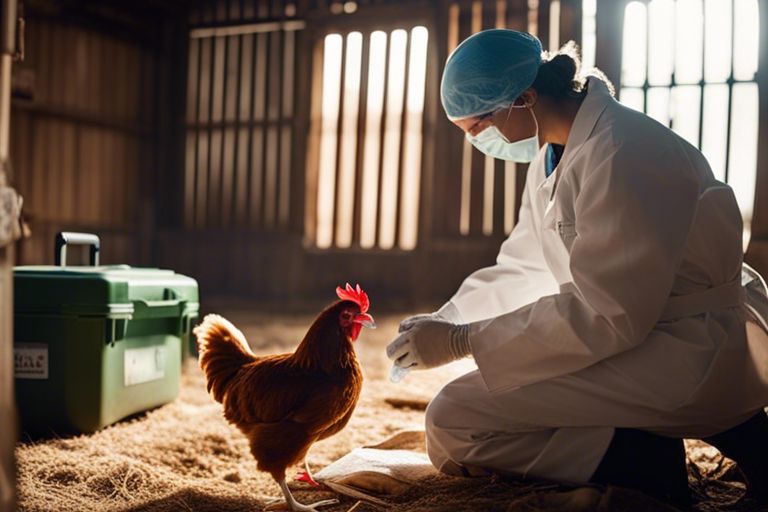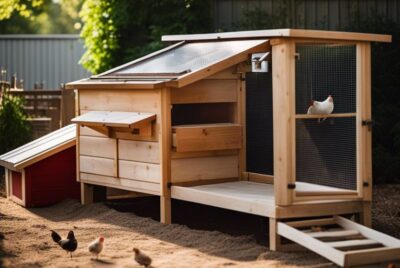Managing Chicken Health – First Aid Essentials
Most chicken owners know that keeping a flock healthy is crucial for their well-being. In this blog post, we will explore essential first aid tips to effectively manage chicken health. From common ailments to basic first aid supplies, being prepared for any health issues that may arise is key to ensuring your chickens stay happy and healthy. By understanding these first aid essentials, you can confidently address minor health concerns and prevent more serious issues in your feathered friends.
Preventative Measures for Chicken Health
Creating a Safe and Healthy Environment
Before bringing chickens into your care, it is crucial to create a safe and healthy environment for them. Ensure that the chicken coop is well-ventilated, clean, and spacious enough for the number of chickens you have. Make sure to provide proper bedding, nesting boxes, and perches for your chickens to roost on. Regularly clean the coop to prevent the buildup of droppings and bacteria.
Any potential hazards such as sharp objects, toxic plants, or predators should be removed or secured to avoid harm to your chickens. Providing access to fresh water, nutritious feed, and adequate natural light will help maintain the overall health and well-being of your flock.
Regular Health Check-Ups and Vaccinations
Regular health check-ups and vaccinations are essential for preventing diseases and ensuring the longevity of your chickens. Schedule routine check-ups with a veterinarian who specializes in poultry to examine your chickens for any signs of illness or issues. Vaccinations are available for common poultry diseases such as Marek’s disease, Newcastle disease, and Infectious Bronchitis. These vaccines can help protect your flock from contagious illnesses.
Regular monitoring of your chickens’ health, behavior, and egg production can help detect any potential health problems early on. By maintaining a vigilant eye on your chickens and providing them with a proper diet and environment, you can significantly reduce the risk of diseases and health issues within your flock.
Common Chicken Ailments and Treatments
Recognizing Signs of Illness
To ensure the well-being of your chickens, it is crucial to be able to recognize the signs of illness early on. Watch out for symptoms such as lethargy, decreased egg production, abnormal droppings, coughing, sneezing, and changes in appetite or behavior. Any of these signs could indicate an underlying health issue that requires attention.
If you notice any of these symptoms in your chickens, it is important to isolate the affected bird to prevent the spread of disease to the rest of the flock. Consult with a veterinarian or experienced poultry keeper to accurately diagnose the problem and determine the appropriate course of treatment.
First Aid Treatments for Minor Injuries and Diseases
One of the most common minor injuries in chickens is pecking wounds, which can lead to bacterial infections if left untreated. To treat pecking wounds, gently clean the affected area with an antiseptic solution and apply a topical antibiotic ointment. Keep the injured bird isolated until the wound heals to prevent further pecking.
In the case of minor diseases such as mild respiratory infections or diarrhea, provide supportive care such as electrolytes in the water and a balanced diet to boost the chicken’s immune system. Keep the coop clean and well-ventilated to aid in the recovery process and prevent the spread of infection to other birds.
Injuries and illnesses can quickly escalate if not addressed promptly, so it is essential to have a well-stocked first aid kit specifically for your chickens. Monitor your flock regularly for any changes in behavior or appearance, and be prepared to administer first aid treatments as needed to keep your chickens healthy and happy.
Emergency Response for Poultry Keepers
Unlike other pets, chickens require a unique approach when it comes to managing their health emergencies. Being prepared with a well-equipped first aid kit and knowing the steps to take during an emergency can make all the difference in ensuring the well-being of your flock.
Assembling a Chicken First Aid Kit
The key to effectively managing chicken health emergencies is having a well-stocked first aid kit specifically tailored to poultry needs. Essential items to include in your kit are bandages, antiseptic solution, gloves, scissors, thermometer, tweezers, saline solution, and poultry-specific medications. It’s recommended to keep the first aid kit in a cool, dry place and regularly check and replenish supplies to ensure its readiness.
Steps to Take During Health Emergencies
Steps to take during health emergencies for chickens include assessing the situation, isolating the affected bird to prevent the spread of any potential illness, and contacting a poultry veterinarian for guidance. In cases of injury, clean the wound with antiseptic solution, apply a bandage if necessary, and monitor the chicken closely for any signs of infection or distress.
A quick and decisive response is crucial during health emergencies for chickens. Being familiar with common poultry ailments and having a plan in place can help you act promptly and effectively to ensure the best possible outcome for your feathered friends.
Long-term Health Management Strategies
Nutritional Needs for Optimal Health
Optimal nutrition plays a critical role in maintaining the health and well-being of your chickens. Providing a balanced diet that meets their specific nutritional needs is essential for optimal health. A diet rich in protein, vitamins, minerals, and water is necessary to support growth, immunity, and overall vitality in chickens.
To ensure your chickens receive the necessary nutrients, consider offering a commercial feed designed for their age and stage of life. Supplementing their diet with fresh fruits, vegetables, and occasional treats can also contribute to a well-rounded nutritional plan. Additionally, access to clean, fresh water at all times is crucial for proper digestion and overall health.
Stress Reduction and Behavioral Health
On top of proper nutrition, stress reduction techniques are vital for maintaining the behavioral health of your flock. Chickens are sensitive creatures that can easily become stressed in challenging environments. Providing a spacious and secure coop, offering opportunities for exercise, and maintaining a clean living area are all factors that can help reduce stress levels in your chickens.
It is also important to observe your chickens’ behavior regularly to identify any signs of distress or aggression. Addressing any behavioral issues promptly can prevent further stress and ensure a harmonious flock dynamic. Creating a peaceful and stimulating environment for your chickens will contribute to their long-term health and well-being.



